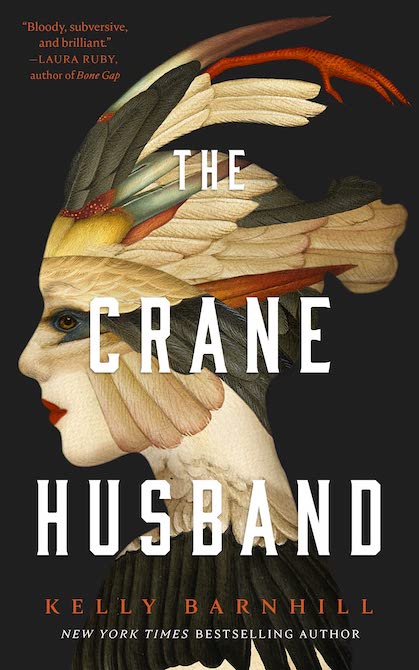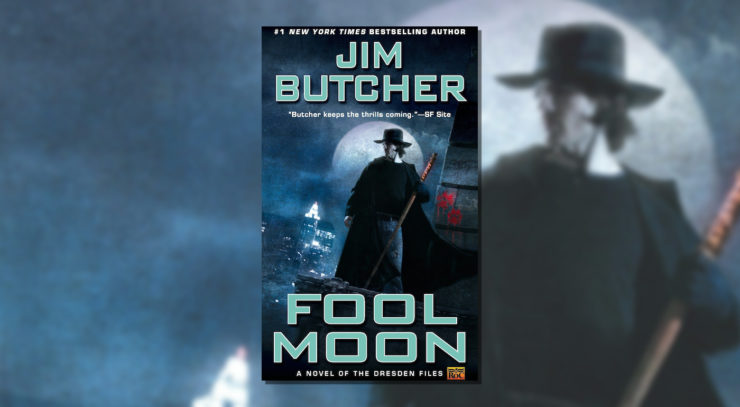Thanks to the comments on my introduction to the Werewolf chapter of the SFF Bestiary, I opted to begin the series of readings with the second of Jim Butcher’s supernatural detective novels starring Harry Dresden. Fool Moon offers a whole gamut of types and styles of werewolf. Each has its own magical rules and manifestations. They all converge on Chicago, and on Chicago’s resident wizard.
It’s rather brilliant. The story stands on its own, though there are references to the events of the previous novel, and hints of further discoveries and mysteries to come. This is pretty much standard for a detective series: there’s the main puzzle that drives the individual book, and the detective’s own larger story that opens up as the series evolves.
The cast of characters is likewise standard, but in a good way. They’re nicely done, and they work well both with and against each other. Harry is a classic slightly seedy private eye. He drives a clunker of a car, and he works mostly alone. His foil is the petite blonde police detective, Lieutenant Murphy, who heads an X-Files sort of department. There’s a cast of lesser characters including a gorgeous reporter for a paranormal newspaper, with whom Harry has history, and a crime boss who keeps trying to get Harry to work for him. And of course there’s a dive bar that caters to the supernatural trade, because what’s a private eye without a dive bar?
The mystery of the month is a series of ghastly murders. It’s clear early on that there must be werewolves involved; the evidence is difficult to miss. A motive (though not necessarily the motive) starts to emerge fairly soon as well. What keeps the plot spinning, and Harry with it, is the question of who is behind it all, and why.
There’s not just one werewolf or pack of werewolves slaughtering random persons (or are they random?) around the full moon. Harry gets a crash course in the different varieties. Some end up working with him, though the alliance is uneasy at best. Others do their best to rip him apart.
The Alphas are wolf shifters. They transform into more or less wolfish form, but keep their human minds and personalities. In their fully human form they’re a gang of nerdy college kids.
The Streetwolves are the reverse. They’re lycanthropes: humans who remain in human form, but whose minds abandon human reason and succumb to raw lust for blood and violence. When under the influence of the wolf-rage, they have enhanced physical senses, and superior strength. They’re a biker gang when they’re not a wolfpack.
Another, smaller pack, the Hexenwolves, become wolves through the powers of a magical belt. The belt acts on them like a drug. They become addicted to the rush of the change; over time, the arrogant, amoral, superpowered wolf overcomes the human personality. They’re serial killers, and they live for the thrill of the kill.
Most powerful and dangerous of all is the loup garou. This is the man who comes a monstrous wolf-creature on the night of the full moon. It’s a literal curse, and it’s hereditary, laid on his family centuries ago. When he’s human, he’s a good man, with good intentions. When the curse is on him, he’s a ravening beast, a relentless killer who exists solely to rend and devour any living thing he meets.
He has no power over either the change or the compulsion to kill. He can be contained within a magical circle, but if the circle is broken, nothing can stop him but a very particular kind of silver. This is the closest analogue to the Wolf Man of the Lon Chaney, Jr. film, with considerably more specific timing of the curse: one night in every lunar cycle.
Buy the Book


The Crane Husband
The other types of werewolf are not so strictly bound to the phase of the moon. Hexenwolves for example can shift at will as long as they’re wearing the belt. The longer they wear it, the harder it is to resist the urge to change.
One more type of wolf shifter is revealed late in the story. That’s the one I was hoping most to see, and it’s well done. The rest shift from human into wolf. This is wolf to human.
They don’t truly present as human, despite a human appearance; their mind works differently, a difference that Harry picks up on from the first. It’s one of the mysteries he has to solve. Who is this person, and what they want? And can they be trusted?
I had a lot of fun with this, despite some irritation with Harry’s episodes of plot-stupidity. For a professional wizard, he’s awfully naïve, and some of the gaps in his knowledge are a little too wide. But he wakes up to some of it, and he’s clearly capable of learning as he goes. He’s wiser at the end than at the beginning.
And the werewolves. So many werewolves, of so many kinds. Real wolves, wolf-men (and women), monsters in more or less wolf form. All different, and all coming together into a grand tangle of a plot. It sorts out in the end, though not every character survives.
I’m glad I started with this. It’s a great general introduction to the range and variety of the species. It’s a rip-roaring adventure, too, and a pretty decent murder mystery. More conventional detective stories will seem tame after this, without a menagerie of monsters and a few good blasts of magic.
Judith Tarr is a lifelong horse person. She supports her habit by writing works of fantasy and science fiction as well as historical novels, many of which have been published as ebooks. She’s written a primer for writers who want to write about horses: Writing Horses: The Fine Art of Getting It Right. She lives near Tucson, Arizona with a herd of Lipizzans, a clowder of cats, and a blue-eyed dog.















The Dresden series gets generally better and better, and the werewolves do occasionally keep returning.
Butcher did a great job of introducing the important supernatural beings in his series by starting it one entity at a time in his early books before moving into the larger world of magic. All urban fantasy has a mystery through-plot that structures the book. His early Dresden books are noir detective novels.
If anyone is interested, I taught a seminar on Butcher’s first novel, STORM FRONT, where I took apart both his world building and his noir detective plot. It’s now on my blog. Tor does not like links so do a search for “Adventures in Writing Byerly” then click on the Jim Butcher label.
Some vague spoilers below so stop reading if you haven’t read the series and don’t like spoilers of any sort.
I love most of the Dresden series and they did get better and better, but the last one, unfortunately, broke the trend, at least in my opinion. It’s too large- scale, too ambitious and it changed a detective series into a story about WW3 where it will become impossible for the human world to remain ignorant. It is an interesting choice on Butcher’s part, but I didn’t like it. In hindsight, with Harry’s opponents getting bigger and bigger and his own abilities growing, I guess I should have seen it coming.
I love his first Cinder Spire book. That could become my new favorite Butcher series.
@1, @2 Good things to know, thank you.
@3 I actually had a similar thought while reading this early volume. Harry is already taking apocalyptic levels of damage, and the people around him are taking even more. If it’s this epically destructive now, and each successive volume tries to top it, I’m not surprised it finally goes, essentially, nuclear.
@@.-@ I think Butcher gets better at balancing the damage Harry takes as he improves as a writer. The early books seem to rely on Harry completing a goal but taking damage or exhausting himself. The answer to “yes, but?” get better as Butcher levels up as a writer. Though as @3 said, he’s running into the problem of too much series per book.
I’m pleased that you like the book as I feel it’s one of the weaker ones in the series. The writing isn’t as polished as his middle entries and it occasionally feels like more of a list of types of werewolves rather than a novel.
The last Dresden book made me finally kick this series to the curb. Butcher killed off another good female character. This makes two. He also morally compromised one of these (before killing her off) as well as compromised a third female character. All so that Dresden can show male, protective angst.
I’m a 63 year old guy and even my old eyes can see a problem here.
@5 The book’s weakness is why it works for this series. I’m here for the werewolves. Those do not disappoint.
Judith – I’m glad you dipped into (bathed in?) Fool Moon. It’s fun and better written than the first book Storm Front. If you read on in the series and in some of the short stories Butcher has written in the Dresden-verse, the Alphas make regular appearances, so you can get some werewolf fixes when you have a yen for them.
Contra to 3 and 6, I liked the most recent Dresden book. Yes, it exceeds prior books in scale and scope and yes it will have huge implications for Harry and his world going forward, as his/their ability to operate on the edges of society under the radar should be compromised, if not eviscerated. And yes he and his world experience serious losses. But it is a darned good read. .
What an unfortunate book. My least favorite of the Dresden books and having now read all of them I think the series is very impressive. It scales well. Now what we need to see is how we pull back. Supernatural is shockingly one of the few series I’ve seen that managed to scale all the way up to literal biblical apocalypse and have some of the best episodes happen after that. They really did a good job of breaking things back down to managable afterwards. I can only hope Dresden can do the same.
I think the werewolves in this series were disappointing which as a fan of werewolves disappointed me. The teenage pack was interesting and I did like seeing them (and again in future books) but it was just imo too many at once. That coupled with awful characterization of his Detective (partner) Murphy. She was an antagonistic force in Storm Front but in Fool Moon she was wildly reaching and insulting .. stupid I guess is the only term I have.
I actually liked Storm Front over Fool Moon but I think everything coming after FM was a step up. With the exception of how he mischaracterized a character in Changes. I was NOT a fan of that little reveal. I spend half the book waiting to find out it was a feint. It was the only thing in that book I hated but I hated it so much if the rest of the book wasn’t amazing I’d have dropped the series.
Speaking directly to Fool Moon I did like the mystery though. There was death, whodunit, red herrings, and twists. All the things i love in a noir series and especially Dresden with it’s flavor of urban magic. I just wasn’t that sold on literally everything else, the specifics.